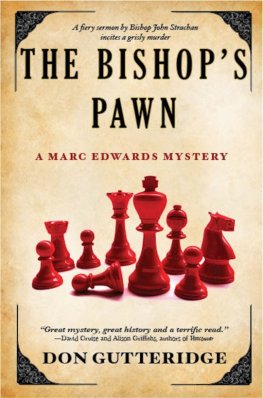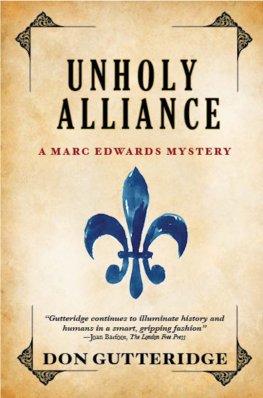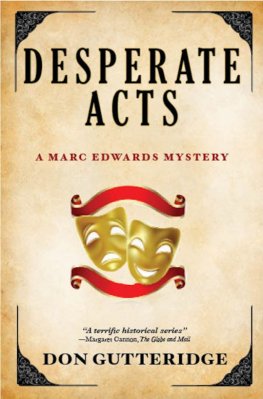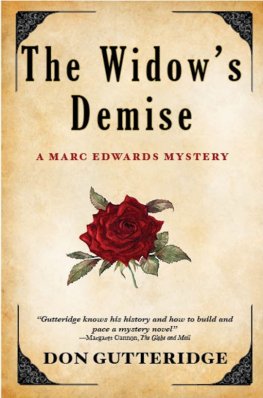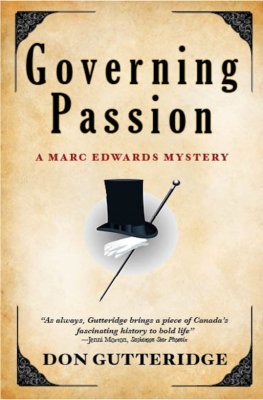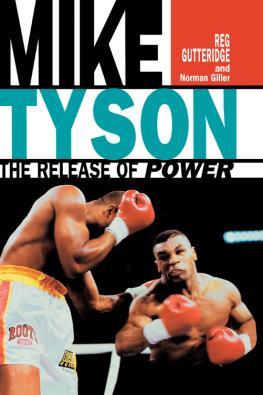Don Gutteridge - The Bishop's Pawn
Here you can read online Don Gutteridge - The Bishop's Pawn full text of the book (entire story) in english for free. Download pdf and epub, get meaning, cover and reviews about this ebook. year: 0101, publisher: Bev Editions, genre: Detective and thriller. Description of the work, (preface) as well as reviews are available. Best literature library LitArk.com created for fans of good reading and offers a wide selection of genres:
Romance novel
Science fiction
Adventure
Detective
Science
History
Home and family
Prose
Art
Politics
Computer
Non-fiction
Religion
Business
Children
Humor
Choose a favorite category and find really read worthwhile books. Enjoy immersion in the world of imagination, feel the emotions of the characters or learn something new for yourself, make an fascinating discovery.
- Book:The Bishop's Pawn
- Author:
- Publisher:Bev Editions
- Genre:
- Year:0101
- Rating:3 / 5
- Favourites:Add to favourites
- Your mark:
- 60
- 1
- 2
- 3
- 4
- 5
The Bishop's Pawn: summary, description and annotation
We offer to read an annotation, description, summary or preface (depends on what the author of the book "The Bishop's Pawn" wrote himself). If you haven't found the necessary information about the book — write in the comments, we will try to find it.
The Bishop's Pawn — read online for free the complete book (whole text) full work
Below is the text of the book, divided by pages. System saving the place of the last page read, allows you to conveniently read the book "The Bishop's Pawn" online for free, without having to search again every time where you left off. Put a bookmark, and you can go to the page where you finished reading at any time.
Font size:
Interval:
Bookmark:
Don Gutteridge
The Bishop's Pawn
ONE
Toronto: March, 1839
Doubtful Dick Dougherty was taking his early-morningconstitutional, ambling placidly down the west side of Bay Streetas he had done now each day for the past six weeks. Ambling wouldhave been his own description of his descent, though the rarecity-dweller abroad at seven A.M. in the near-dark might havereferred to the locomotion of his three-hundred-pound bulk moreaptly as trundelling. Still, such ordinary folk seemed pleasedenough to see the infamous barrister touching the peak of atradesmans cap in silent greeting or nodding sleepily from thebench of a market-cart or waving a trowel from the other side ofthe street in jocular salute. These courtesies were invariablyacknowledged by the single dip of a Dougherty chin (one ofseveral), as if too fervid a response might upset the delicatebalance of the great mans progress through the streets of hisadopted town. On this particular morning Dougherty had slowed hispace, though only he would have noticed. For spring was in the air.Its taste could be detected on the tongue, its scents anticipatedin the redolent breeze wafting up from the lake at the foot of thestreet. The last of the winter slush had melted in yesterdays sun,while the overnight frost had kept the side-path stiff andconducive to walking for those prudent enough to rise before dawnand venture forth into the free and unfettered air of QueenVictorias dominion.
No such thought and certainly no suchconstitutional strolling would have been possible two months ago;indeed, would have been unthinkable. Public disgrace anddishonourable exile had been Doughertys lot, and he had, itseemed, given himself up to the inevitable. Only the presence ofhis wards, Brodie and Celia, and his promise to their dying fatherthat he would look out for them as if they were his own (as theywere, in the way that mattered most) had kept him from making animmediate, self-administered exit from an ungrateful and unjustworld. Even so, he knew now, with the clarity that usuallyaccompanies hindsight, that he had been subconsciously eating anddrinking himself to death. He had not left his cottage for weeks.He had feigned interest in Brodies enthusiastic accounts of hisdaily triumphs at the Commercial Bank where he worked as a clerk.He had shamelessly let Celia, beautiful and intelligent and cravingsociety, cater to his incessant needs and peremptory demands, as ifshe were no more than a charwoman or a hired nurse.
All that had changed dramatically when, inJanuary, he had permitted himself to be persuaded to become engagedin the defense of a young man charged with murder. His brilliantperformance before the Court of Queens Bench and Chief JusticeRobinson had resulted in the most satisfactory outcome that couldhave been imagined. Ordinary folk had cheered him as he left thecourtroom, and in the numerous taverns of the town his verbalexploits and crafty legal manoeuvres had risen to the status oflegend. Even the more elevated classes, who had heretofore fed therumour mill with lurid and fantastical tales of the iniquities thathe was alleged to have perpetrated in his native New York, had beencompelled to offer him grudging respect.
But such an unexpected response to hiscourtroom performance and its happy consequences a military heroexonerated and a traitor exposed had put the Benchers of the LawSociety in a difficult position. Indeed, they felt themselves tohave been thrust unfairly upon the horns of an ethical dilemma.For, against their better judgement and with motives more politicalthan forensic, they had, last January, agreed to grant RichardDougherty, an ostracized but not-quite-disbarred advocate from aforeign democracy, a temporary license to practise law in UpperCanada. Having taken for granted that he would fail, they had beenchagrined and aggrieved at his success and his nettling popularity.How could they revoke his license now? On what grounds, other thanincontrovertible proof of the indiscretions and turpitude that hadseen him expelled from New York, could they possibly refuse towelcome him into the provincial fraternity? The very thought ofthat repulsive, waddling, triple-chinned, upstart Yankee occupyinga seat in Lawyers Hall at Osgoode made their periwigs tremble.Already they had twice postponed a scheduled hearing to considerhis case, hoping that the man himself would come to his senses andreturn quietly to his retirement. To their consternation, however,he had not three weeks ago brazenly tacked a gold-letteredshingle upon the front door of his cottage on Bay Street aboveKing:
R. W. Dougherty: Attorney-at-Law
As far as anyone knew, he had not taken anyclients as yet (serious crimes, his specialty, were thankfully fewand far between in a capital city that boasted not more than eightthousand souls). Surely the fellow would have the decency toabstain from active practice until the Benchers convened at the endof the month and made their decision.
Dougherty ambled past the British-AmericanCoffee House. Its aroma of coffee and fresh baking were astantalizing as the comfortable chatter of the early-risers alreadysettled at a favourite or privileged table inside. Resistingtemptation, he crossed King Street, glancing east and west to note,as he always did, that none of the elegant shops had yet opened,though a wreath or two of smoke above several of them suggestedthat the servants were up and about. At Market Street (now calledWellington by those in the know), he had to pause briefly to let adrayman and his mule pass by, the split logs in his cart rattlingin discordant tune with the frosted ruts of the poorly gravelledroad.
Below King, the side-path became one of theintermittent boardwalks that the city fathers referred to as apublic improvement, but the thaws and freeze-ups of a capriciouswinter and unannounced spring had left them more treacherous thanever. Dougherty teetered to his left and resumed his ambling,discreetly, along the rutted roadway. He tried to suppress themutinous thoughts that insisted on tweaking him at moments likethis: that the fine thoroughfares of his native New York City werecobbled and impervious to weather and wear; that hardwood walkwaysprovided secure paths for promenading or for the brisk,business-like trod of men with purpose and importance. Already, inthat great metropolis several of the main streets were beingilluminated with the wonder of the gas-lamp! He quickly blotted outthe image, fearing it might overwhelm his current resolve.
After all, backwater though it undoubtedlywas, Toronto had offered him a second chance, a reprieve fromdespair and physical decay. Days after the trial had ended inJanuary, he had begun to remake himself. He had tempered his manyappetites for food, drink, cigars, even coffee. With theever-loyal assistance of Brodie and Celia bless them he hadstarted to exercise. At first he had been able merely tocircumnavigate the parlour of his cottage no more than three orfour times before his ankles ached or his breath seized somewherein his mountainous chest. Then it was out onto Bay Street, awilling ward on each arm, for an unsteady progress down thehalf-block to King, across to the other side, and then woozy,puffing but determined back up to the cottage. When his legsrefused any further abuse, Celia and Brodie would slide him,lock-kneed, along the icy pathway as if he were a marionette onskates. Finally, five weeks ago he had ventured out under his ownsteam (his keepers an anxious quarter-block behind him). Two weekslater, somewhat slimmer and certainly more robust of leg and lung,he had begun his unsupervised morning constitutional, following thesame unchanging route, seven days a week.
More important than his slowly recoveringhealth and the occasional brief bout of optimism was the decisionto send Celia off to Miss Tysons Academy for Young Ladies toresume the studies she had had to abandon when they had left NewYork and made their way here over a year ago. A cook andhousekeeper were hired during the day to give Celia the time andleisure necessary to scholarly pursuit, for which she had alwaysshown a precocious capacity. (Still, the sainted girl insisted ontending to his every perceived need until ordered to her room andher books.) Brodie, more confident and gregarious, had taken tobanking as a duck to its pond, exhibiting his fathers easy wayswith both the common people and their betters. Dennis, God resthim, would have been proud of the lad. And now that his guardianseemed able and willing to take care of himself during the daywithout intimidating the servants overly much or too often, Brodieno longer had to dash home for luncheon and a discreet assessmentof the invalid. He could now devote his full attention to theCommercial Bank and to the young governess at Baldwin House. It wasamazing, Dougherty thought as he watched the first pale intimationof daylight wash across Toronto Bay below him, how the diminutionof guilt and self-loathing improved ones general outlook.
Font size:
Interval:
Bookmark:
Similar books «The Bishop's Pawn»
Look at similar books to The Bishop's Pawn. We have selected literature similar in name and meaning in the hope of providing readers with more options to find new, interesting, not yet read works.
Discussion, reviews of the book The Bishop's Pawn and just readers' own opinions. Leave your comments, write what you think about the work, its meaning or the main characters. Specify what exactly you liked and what you didn't like, and why you think so.

